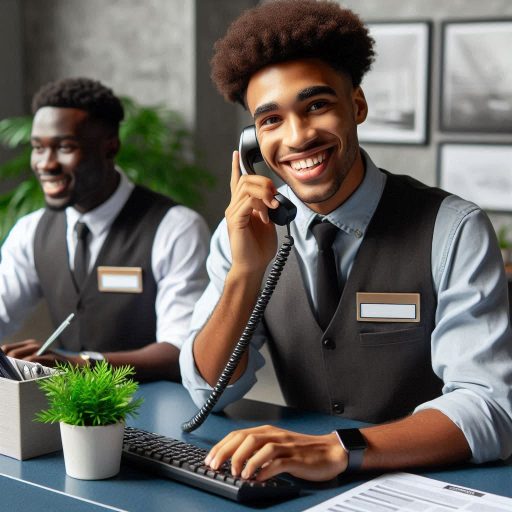Introduction
The front desk agent plays a crucial role in the hospitality industry as front desk agent efficiency.
They serve as the first point of contact for guests.
Their responsibilities include checking guests in and out, answering inquiries, and managing reservations.
Efficiency is vital in performing these tasks effectively.
An efficient front desk agent enhances guest satisfaction and contributes to a smooth operation.
When agents handle tasks promptly, guests feel valued and appreciated.
This efficiency reduces wait times and minimizes potential frustrations, creating a positive atmosphere.
To excel in their role, front desk agents can adopt various tips and strategies.
They can develop strong communication skills to interact effectively with guests and colleagues.
Mastering time management techniques allows agents to prioritize tasks efficiently.
Utilizing technology streamlines processes and simplifies daily responsibilities.
Additionally, developing problem-solving skills helps agents tackle unexpected challenges quickly.
Collaborating with team members fosters a supportive work environment.
Staying organized and maintaining a clean workspace enhances productivity.
Finally, seeking feedback promotes continuous improvement in performance.
This blog post will explore these essential strategies, helping front desk agents improve their efficiency and deliver exceptional service in the hospitality industry.
Develop Strong Communication Skills
Strong communication skills are essential for improving efficiency as a front desk agent.
Clear and concise communication ensures smooth interactions with both guests and colleagues, reducing misunderstandings and mistakes.
When you communicate effectively, you create a positive environment that boosts productivity and enhances the guest experience.
Importance of Clear and Concise Communication
Clear communication with guests allows you to meet their needs promptly.
When you provide accurate and simple information, guests feel more confident and satisfied with their stay.
Miscommunication often leads to delays, frustration, and repeated questions.
For example, clearly explaining check-in procedures or hotel policies prevents confusion and speeds up service.
Likewise, when you communicate concisely with colleagues, it ensures that tasks are completed correctly and efficiently.
Everyone understands their responsibilities, reducing the chances of errors that may slow down operations.
Tips for Effective Verbal Communication
Start by speaking clearly and at an appropriate pace.
Avoid using jargon or overly complex language, especially when talking to guests who may not be familiar with industry terms.
Always maintain a friendly and professional tone.
Guests will appreciate your warmth and attentiveness, which makes their experience more enjoyable.
When interacting with guests, active listening is key.
Pay attention to what they say, repeat important details, and ask follow-up questions if necessary.
This practice ensures you fully understand their needs, reducing the likelihood of mistakes.
Lastly, maintain eye contact and use positive body language, such as smiling and nodding, to show attentiveness.
Also, Written communication at the front desk often involves emails, messages, and notes.
Always ensure that your writing is clear, concise, and professional.
Avoid long-winded explanations and get to the point quickly.
Structure your emails or messages logically, starting with a greeting, the main point, and a closing statement.
How Good Communication Enhances Efficiency
Good communication streamlines front desk operations.
When you provide clear instructions to guests, it reduces the time spent answering repeated questions.
Guests know exactly where to go and what to do.
Likewise, effective communication with colleagues prevents misunderstandings that could lead to delays or mistakes.
For example, clearly conveying special requests or issues helps the housekeeping or maintenance teams respond quickly, enhancing overall guest satisfaction.
With less time spent clarifying details or resolving miscommunication, you can focus more on other essential tasks, improving your overall efficiency as a front desk agent.
Master time management techniques
Mastering time management is essential for front desk agents to handle multiple tasks efficiently.
Prioritizing tasks and managing time effectively ensures smooth operations, boosts productivity, and enhances guest satisfaction.
By setting clear goals and using tools to stay organized, front desk agents can stay on top of their responsibilities and maintain a well-run front desk.
Importance of Prioritizing Tasks and Managing Time Effectively
Prioritizing tasks is crucial in a fast-paced front desk environment.
With many responsibilities, it’s essential to determine which tasks require immediate attention and which can wait.
For example, attending to guest check-ins and answering urgent inquiries should always take precedence over paperwork or routine tasks.
This prioritization allows you to respond quickly to guest needs, reducing wait times and improving service.
Effective time management also helps you avoid feeling overwhelmed, as you can tackle urgent tasks first and leave less critical ones for later.
It prevents unnecessary stress and ensures you remain calm under pressure, which directly impacts guest satisfaction.
Strategies for Setting Goals and Deadlines
Setting clear goals helps front desk agents stay focused and motivated.
Start each shift by outlining the key tasks you need to accomplish.
For example, you might prioritize check-ins, manage reservation changes, and handle guest requests within a specific time frame.
Breaking down larger tasks into smaller, manageable steps also makes them easier to accomplish.
Deadlines are equally important for ensuring tasks get done on time.
Assigning deadlines to tasks helps you stay on track and prevents tasks from piling up.
For instance, you can set a deadline to respond to emails within the first hour of your shift.
By doing so, you create a structured plan for completing tasks efficiently.
Additionally, flexibility is key in managing unexpected issues while sticking to your goals.
If an urgent guest request arises, quickly adjust your schedule without losing focus on other tasks.
Tools and Apps That Can Help Front Desk Agents Stay Organized
Several tools and apps can help front desk agents stay organized and manage their time more effectively.
Task management apps, such as Trello or Asana, allow you to create to-do lists, set deadlines, and track progress.
These apps are particularly useful for keeping track of tasks that need to be completed throughout the day.
Calendar apps, like Google Calendar, can help you schedule important tasks or appointments and send reminders to ensure you don’t forget anything.
Time-tracking apps, such as Toggl, can help you monitor how long it takes to complete certain tasks, giving you insight into where you can improve your efficiency.
Additionally, using digital checklists for daily tasks ensures that nothing is overlooked, allowing you to stay organized and focused on guest service.
Mastering time management techniques allows front desk agents to prioritize tasks, stay organized, and deliver exceptional service.
Transform Your Career Today
Unlock a personalized career strategy that drives real results. Get tailored advice and a roadmap designed just for you.
Start NowRead: The Role of Technology in Modern Pet Grooming
Utilize technology to streamline processes
Front desk agents can significantly enhance efficiency by using technology to streamline daily operations.
By leveraging various software tools, they can automate tasks, reduce human error, and focus more on guest interactions.
This makes processes like check-ins, bookings, and guest communications faster and more accurate, improving overall service quality.
Different Software and Tools Available for Front Desk Operations
Front desk agents can use various software solutions to optimize their workflow.
Property management systems (PMS), such as Opera or Cloudbeds, centralize essential tasks like reservations, guest profiles, and billing.
These systems automatically update bookings, room availability, and guest details in real time, saving significant time and reducing mistakes.
Additionally, customer relationship management (CRM) tools like Zoho or Salesforce help manage guest data, track preferences, and personalize services.
Payment processing systems such as Square or Stripe simplify transactions, enabling agents to handle payments quickly and securely.
These tools not only enhance operational efficiency but also ensure that guest interactions are smooth and error-free.
Incorporating technology into daily front desk tasks streamlines every aspect of operations.
Tips for Integrating Technology into Daily Tasks
Integrating technology effectively requires familiarity with the tools available.
Start by learning the basics of your hotel’s systems through training or tutorials.
Practice using these tools during daily tasks to build confidence.
For example, use the PMS to handle reservations instead of manually recording bookings.
Automation reduces human error, leaving more time for engaging with guests.
Set up communication templates for responding to common guest inquiries, which can save time.
Regularly updating software is essential for optimal performance, preventing crashes or security breaches.
By fully utilizing the available software, you increase efficiency while ensuring better service for guests.
How Technology Can Simplify Check-ins, Bookings, and Guest Interactions
Technology makes check-ins quicker and more convenient.
Online check-in systems allow guests to complete forms and submit identification ahead of arrival, speeding up the process at the front desk.
Self-service kiosks also empower guests to check themselves in, reducing waiting times and freeing up staff to handle other tasks.
Reservation systems automatically track bookings, ensuring availability and avoiding double-booking issues.
This automation helps maintain accurate records and simplifies reservation management.
Additionally, technology enhances guest interactions by offering personalized services.
With guest preferences stored in the CRM or PMS, agents can anticipate guest needs and provide tailored services.
Messaging apps and chatbots also allow for faster, more efficient communication between guests and staff.
Utilizing technology at the front desk improves both efficiency and guest satisfaction.
Automating routine processes enables agents to spend more time on high-value tasks, resulting in a smoother guest experience and more organized operations.
Read: Customer Service Tips for Pet Grooming Professionals
Develop problem-solving skills
Front desk agents must develop problem-solving skills to handle challenges quickly and efficiently.
By thinking fast and troubleshooting issues, they prevent delays and improve operations.
Mastering problem-solving allows agents to confidently manage difficult guests and unexpected situations, enhancing overall service quality.
Importance of Thinking Quickly and Troubleshooting Issues
In a fast-paced front desk environment, thinking quickly is essential.
Agents face unexpected problems daily, from reservation issues to guest complaints.
Quick thinking ensures these issues are resolved before they escalate.
For example, if a guest arrives and their room is unavailable, you must immediately find an alternative solution.
Whether offering an upgrade or providing compensation, quick resolutions prevent dissatisfaction.
Troubleshooting issues also shows competence and professionalism, building guest trust.
Effective troubleshooting helps resolve problems without escalating them further.
Swift problem-solving keeps operations running smoothly, ensuring guests receive prompt and effective service.
Strategies for Handling Difficult Guests or Unexpected Situations
Handling difficult guests requires patience, empathy, and professionalism.
First, remain calm when faced with an upset guest.
Listen carefully to their concerns and show genuine understanding of their frustrations.
This simple acknowledgment can help defuse tension.
After understanding the problem, offer realistic solutions.
For instance, if a guest complains about a room issue, offering a complimentary upgrade can quickly resolve the situation.
Always stay professional, even when guests are rude or unreasonable.
For unexpected situations, such as system failures or overbookings, having contingency plans in place is essential.
Keep backup rooms available or alternate payment methods ready to resolve technical issues swiftly.
Communicating transparently with guests about delays or problems ensures they feel informed and respected.
Clear communication prevents further frustration and helps manage expectations.
How Effective Problem-Solving Can Prevent Delays and Improve Efficiency
Effective problem-solving improves efficiency by preventing delays in service.
For example, resolving a guest issue quickly allows you to move on to other tasks without disruption.
This ensures that no other guests are kept waiting while you address problems.
Efficient problem-solving prevents workflow disruptions at the front desk, allowing operations to proceed smoothly.
Problem-solving also enhances teamwork.
When agents handle issues independently, they prevent their colleagues from becoming overwhelmed by unresolved tasks.
This collective effort maintains the front desk’s overall productivity and allows the entire team to stay on schedule.
Moreover, effective problem-solving minimizes guest complaints and reduces the time spent addressing follow-up issues, further streamlining daily operations.
Developing problem-solving skills allows front desk agents to manage challenges confidently and effectively.
Quick thinking, clear communication, and practical solutions prevent small issues from becoming larger problems.
This not only improves guest satisfaction but also boosts overall front desk efficiency, ensuring smoother, more productive daily operations.
By mastering problem-solving, agents can provide high-quality service in any situation.
Read: Nail Technician Etiquette: Dos and Don’ts

Collaborate with team members
Effective teamwork is essential in a front desk environment.
Collaborating with colleagues improves efficiency, solves problems faster, and enhances guest satisfaction.
When front desk agents work together, they ensure smooth operations, provide consistent service, and create a more enjoyable guest experience.
Benefits of Teamwork in a Front Desk Environment
Teamwork in a front desk setting offers numerous benefits.
First, it ensures that all tasks are completed promptly and accurately.
If one agent is busy, another can step in to assist, preventing delays and keeping service flowing.
Collaboration also enhances problem-solving.
When multiple agents share ideas and expertise, they can resolve issues faster and more effectively.
Teamwork reduces the pressure on individual agents, creating a supportive environment where everyone works toward the same goal.
Additionally, when team members support each other, it leads to a more positive work atmosphere.
A cohesive team creates a seamless experience for guests, which boosts overall satisfaction.
Finally, teamwork helps ensure that guest interactions remain consistent.
When all agents follow the same procedures and communicate clearly with each other, guests receive the same high-quality service, regardless of who assists them.
Tips for Effective Communication and Collaboration with Colleagues
Effective communication is key to successful teamwork.
Start by maintaining open lines of communication with your colleagues throughout each shift.
Share important updates about guest preferences, reservations, or potential issues as soon as they arise.
This helps everyone stay informed and prepared.
Practice active listening when colleagues speak.
Understanding their concerns or suggestions ensures smoother collaboration.
Use clear, concise language when sharing information, and avoid misunderstandings by confirming details when necessary.
It’s also helpful to establish regular check-ins with your team.
This could involve quick meetings at the start of each shift to discuss daily tasks, expectations, and any potential challenges.
Sharing responsibilities equally is another important aspect of teamwork.
Be willing to assist others when needed, and ask for help when you’re overwhelmed.
Working together to complete tasks boosts morale and prevents burnout.
How Working Together Can Improve Efficiency and Guest Satisfaction
Collaboration enhances front desk efficiency by streamlining operations.
When agents work together, they can handle guest requests faster, ensuring that no one is left waiting.
For example, while one agent processes check-ins, another can handle incoming calls, minimizing wait times for both tasks.
By distributing responsibilities, agents can focus on specific tasks without feeling rushed or overwhelmed.
This ensures higher accuracy and faster service.
Working together also improves guest satisfaction.
When guests see agents communicating clearly and working as a cohesive team, it instills confidence in the service they receive.
Additionally, team members who collaborate effectively are more likely to anticipate guest needs and provide seamless experiences, further boosting satisfaction.
Team collaboration is essential to the success of front desk operations.
Effective teamwork improves efficiency, enhances problem-solving, and ensures a consistent guest experience, leading to greater satisfaction for both staff and guests.
Read: Developing Patience and Precision in Pet Grooming
Stay organized and maintain a clean workspace
A clean, organized workspace is crucial for front desk agents to work efficiently.
Keeping the front desk tidy ensures quick access to important tools and information, improves productivity, and enhances the overall guest experience.
Importance of Keeping the Front Desk Area Tidy and Organized
Maintaining a clean and organized front desk area is essential for several reasons.
First, it creates a professional appearance, which is important as the front desk is the first point of contact for guests.
A cluttered or messy workspace can give a negative impression, making guests feel uneasy or question the level of service they’ll receive.
A tidy area, however, instills confidence in the professionalism of the staff.
Organization also promotes efficiency.
When everything is in its proper place, front desk agents can quickly find what they need, whether it’s a guest’s reservation information, phone numbers, or office supplies.
This saves time and reduces errors, ensuring smoother operations.
Additionally, a clean environment minimizes distractions.
Agents can focus better on their tasks without the stress or frustration caused by disorganization.
Strategies for Decluttering and Maintaining a Clean Workspace
To maintain a clean workspace, start by decluttering regularly.
Remove unnecessary items from the desk and store them in designated areas.
Only keep essential items, like the computer, phone, and guest forms, on the desk surface.
This reduces clutter and creates a more open, organized space.
Develop a routine for cleaning and tidying the workspace at the beginning and end of each shift.
Wipe down surfaces, organize papers, and restock any supplies that have been used.
Keeping storage areas organized is also important.
Use labeled folders or drawers for different categories, such as reservations, guest requests, and invoices, so everything is easy to locate.
It’s also a good idea to implement a “one in, one out” rule for paperwork.
This prevents unnecessary accumulation by ensuring that when a new document is added, an old or completed one is removed.
Set a reminder to clean out outdated materials, which will help maintain organization over time.
How a Well-Organized Desk Can Help Front Desk Agents Work More Efficiently
A well-organized desk enhances efficiency by allowing front desk agents to work more productively.
When everything is easily accessible, agents spend less time searching for materials or information, enabling them to assist guests faster.
This quick access prevents unnecessary delays and helps maintain a smooth workflow.
Additionally, staying organized reduces the risk of losing important documents or making mistakes due to misplaced items.
Having a clear system for organizing paperwork, supplies, and guest information helps agents stay on top of their tasks.
An organized environment also contributes to a calm mindset, allowing agents to focus fully on providing excellent service without distractions or stress.
Maintaining a clean and organized workspace is key to being an efficient front desk agent.
By decluttering regularly and organizing important materials, agents can provide faster, more effective service while enhancing the guest experience.
Transform Your Career Today
Unlock a personalized career strategy that drives real results. Get tailored advice and a roadmap designed just for you.
Start NowSeek feedback and continuous improvement
Seeking feedback is vital for front desk agents who want to enhance their skills and improve their efficiency.
By actively seeking input from guests and supervisors, agents can identify areas for growth and develop a mindset of continuous improvement.
Importance of Seeking Feedback from Guests and Supervisors
Feedback from guests and supervisors provides valuable insights into your performance as a front desk agent.
Guest feedback helps you understand their expectations and gauge how well you’re meeting them.
For example, if multiple guests mention slow service during check-in, you can take steps to speed up the process.
Listening to guests’ experiences helps you recognize patterns and adjust your approach to better serve them.
Feedback from supervisors is equally important.
They provide guidance on how you can improve, whether it’s refining communication, handling difficult situations better, or working more efficiently.
Supervisors see the bigger picture and can offer constructive advice that helps you grow professionally.
Seeking feedback also shows your commitment to personal growth and your desire to provide excellent service.
Strategies for Learning from Mistakes and Constantly Improving
Learning from mistakes is a key part of professional development.
First, acknowledge your mistakes without defensiveness.
Accepting responsibility demonstrates maturity and a willingness to improve.
After identifying where you went wrong, reflect on the situation.
What could you have done differently? For example, if you mishandled a guest complaint, think about how a different approach could have led to a better outcome.
Always ask for feedback after an incident to gain additional perspectives.
Seeking input from your supervisor or colleagues can provide clarity on how to handle similar situations more effectively in the future.
Keep a record of recurring issues or mistakes and take proactive steps to address them.
Regularly review your performance and set small goals for improvement.
This consistent effort builds stronger skills over time, making you a more effective front desk agent.
How Feedback Can Help Front Desk Agents Identify Areas for Growth and Enhance Efficiency
Feedback plays a crucial role in identifying areas where you can improve efficiency.
Guests may point out areas where service lags, such as long wait times or unclear communication.
Addressing these issues helps streamline your workflow and make processes smoother.
Supervisors can also provide tips on improving your time management, organizing your tasks, or working with technology more effectively.
By taking their suggestions seriously, you can develop better habits that lead to increased productivity.
Continuous feedback also helps prevent stagnation.
Instead of sticking to the same routine, you’ll be encouraged to experiment with new methods that could enhance your performance.
Seeking regular feedback ensures you’re always working to be the best version of yourself, and it demonstrates a strong commitment to professional excellence.
Front desk agents who actively seek feedback can consistently improve their performance and efficiency.
Conclusion
Improving efficiency as a front desk agent requires mastering several key skills.
Strong communication, time management, and organization are essential for success.
Utilizing technology, developing problem-solving skills, and collaborating with team members can also enhance your performance.
Seeking feedback and maintaining a clean workspace further contributes to working more efficiently.
Front desk agents should implement these tips and strategies to maximize their productivity.
By staying organized, communicating effectively, and working closely with colleagues, agents can streamline their tasks and deliver excellent guest service.
Learning from feedback and mistakes also fosters continuous improvement, helping agents grow in their roles.
Efficiency not only benefits guests but also helps agents advance in the hospitality industry.
Providing faster, more accurate service improves guest satisfaction, which reflects positively on the hotel and your performance.
Efficient agents handle their tasks with confidence, reduce errors, and create a seamless guest experience.
Prioritizing efficiency can set you apart and open doors to greater opportunities in your career.
By focusing on these strategies, front desk agents can deliver outstanding service while achieving professional growth in the fast-paced world of hospitality.




